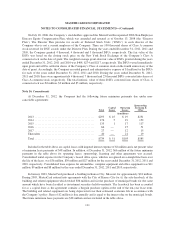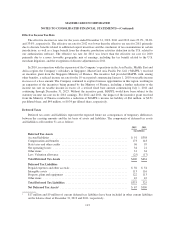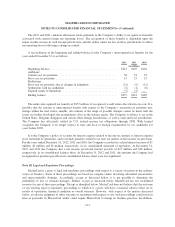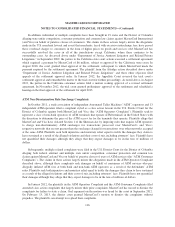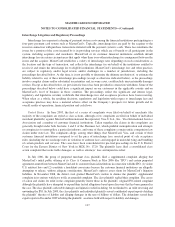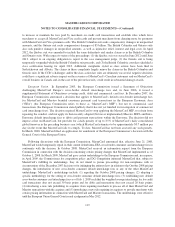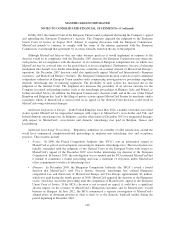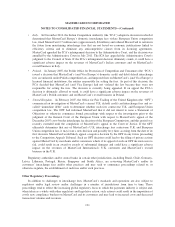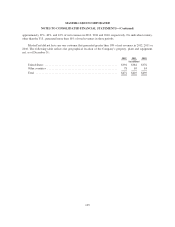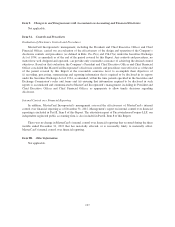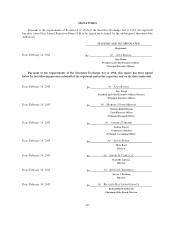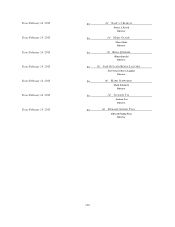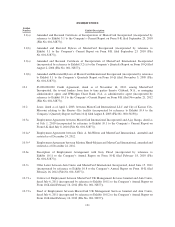MasterCard 2012 Annual Report Download - page 125
Download and view the complete annual report
Please find page 125 of the 2012 MasterCard annual report below. You can navigate through the pages in the report by either clicking on the pages listed below, or by using the keyword search tool below to find specific information within the annual report.MASTERCARD INCORPORATED
NOTES TO CONSOLIDATED FINANCIAL STATEMENTS—(Continued)
•Italy. In November 2010, the Italian Competition Authority (the “ICA”) adopted a decision in which it
determined that MasterCard Europe’s domestic interchange fees violate European Union competition
law, fined MasterCard 2.7 million euro (approximately $4 million) and ordered MasterCard to refrain in
the future from maintaining interchange fees that are not based on economic justifications linked to
efficiency criteria and to eliminate any anticompetitive clauses from its licensing agreements.
MasterCard appealed the ICA’s infringement decision to the Administrative Court, and the decision was
annulled by the Administrative Court in July 2011. The ICA has appealed the Administrative Court’s
judgment to the Council of State. If the ICA’s infringement decision ultimately stands, it could have a
significant adverse impact on the revenues of MasterCard’s Italian customers and on MasterCard’s
overall business in Italy.
•Poland. In January 2007, the Polish Office for Protection of Competition and Consumers (the “PCA”)
issued a decision that MasterCard’s (and Visa Europe’s) domestic credit and debit default interchange
fees are unlawful under Polish competition law, and imposed fines on MasterCard’s (and Visa Europe’s)
licensed financial institutions, the entities responsible for setting the fees. As part of this decision, the
PCA decided that MasterCard (and Visa Europe) had not violated the law because they were not
responsible for setting the fees. The decision is currently being appealed. If on appeal the PCA’s
decision is ultimately allowed to stand, it could have a significant adverse impact on the revenues of
MasterCard’s Polish customers and on MasterCard’s overall business in Poland.
•United Kingdom. In February 2007, the Office for Fair Trading of the United Kingdom (the “OFT”)
commenced an investigation of MasterCard’s current U.K. default credit card interchange fees and so-
called “immediate debit” cards to determine whether such fees contravene U.K. and European Union
competition law. The OFT had informed MasterCard that it did not intend to issue a Statement of
Objections or otherwise commence formal proceedings with respect to the investigation prior to the
judgment of the General Court of the European Union with respect to MasterCard’s appeal of the
December 2007 cross-border interchange fee decision of the European Commission, and this period was
recently extended until the completion of MasterCard’s appeal to the Court of Justice. If the OFT
ultimately determines that any of MasterCard’s U.K. interchange fees contravene U.K. and European
Union competition law, it may issue a new decision and possibly levy fines accruing from the date of its
first decision. MasterCard would likely appeal a negative decision by the OFT in any future proceeding
to the Competition Appeals Tribunal. Such an OFT decision could lead to the filing of private actions
against MasterCard by merchants and/or consumers which, if its appeal of such an OFT decision were to
fail, could result in an award or awards of substantial damages and could have a significant adverse
impact on the revenues of MasterCard International’s U.K. customers and MasterCard’s overall
business in the U.K.
Regulatory authorities and/or central banks in certain other jurisdictions, including Brazil, Chile, Germany,
Latvia, Lithuania, Portugal, Russia, Singapore and South Africa, are reviewing MasterCard’s and/or its
customers’ interchange fees and/or other practices and may seek to commence proceedings related to, or
otherwise regulate, the establishment of such fees and/or such practices.
Other Regulatory Proceedings
In addition to challenges to interchange fees, MasterCard’s standards and operations are also subject to
regulatory and/or legal review and/or challenges in a number of jurisdictions from time to time. These
proceedings tend to reflect the increasing global regulatory focus to which the payments industry is subject and,
when taken as a whole with other regulatory and legislative action, such actions could result in the imposition of
costly new compliance burdens on MasterCard and its customers and may lead to increased costs and decreased
transaction volumes and revenues.
121


